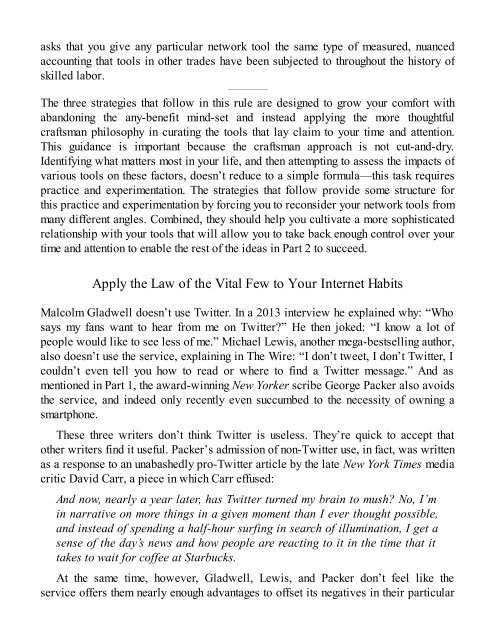Deep Work_ Rules for focused success in a distracted world ( PDFDrive.com )
You also want an ePaper? Increase the reach of your titles
YUMPU automatically turns print PDFs into web optimized ePapers that Google loves.
asks that you give any particular network tool the same type of measured, nuanced<br />
account<strong>in</strong>g that tools <strong>in</strong> other trades have been subjected to throughout the history of<br />
skilled labor.<br />
The three strategies that follow <strong>in</strong> this rule are designed to grow your <strong>com</strong><strong>for</strong>t with<br />
abandon<strong>in</strong>g the any-benefit m<strong>in</strong>d-set and <strong>in</strong>stead apply<strong>in</strong>g the more thoughtful<br />
craftsman philosophy <strong>in</strong> curat<strong>in</strong>g the tools that lay claim to your time and attention.<br />
This guidance is important because the craftsman approach is not cut-and-dry.<br />
Identify<strong>in</strong>g what matters most <strong>in</strong> your life, and then attempt<strong>in</strong>g to assess the impacts of<br />
various tools on these factors, doesn’t reduce to a simple <strong>for</strong>mula—this task requires<br />
practice and experimentation. The strategies that follow provide some structure <strong>for</strong><br />
this practice and experimentation by <strong>for</strong>c<strong>in</strong>g you to reconsider your network tools from<br />
many different angles. Comb<strong>in</strong>ed, they should help you cultivate a more sophisticated<br />
relationship with your tools that will allow you to take back enough control over your<br />
time and attention to enable the rest of the ideas <strong>in</strong> Part 2 to succeed.<br />
Apply the Law of the Vital Few to Your Internet Habits<br />
Malcolm Gladwell doesn’t use Twitter. In a 2013 <strong>in</strong>terview he expla<strong>in</strong>ed why: “Who<br />
says my fans want to hear from me on Twitter?” He then joked: “I know a lot of<br />
people would like to see less of me.” Michael Lewis, another mega-bestsell<strong>in</strong>g author,<br />
also doesn’t use the service, expla<strong>in</strong><strong>in</strong>g <strong>in</strong> The Wire: “I don’t tweet, I don’t Twitter, I<br />
couldn’t even tell you how to read or where to f<strong>in</strong>d a Twitter message.” And as<br />
mentioned <strong>in</strong> Part 1, the award-w<strong>in</strong>n<strong>in</strong>g New Yorker scribe George Packer also avoids<br />
the service, and <strong>in</strong>deed only recently even succumbed to the necessity of own<strong>in</strong>g a<br />
smartphone.<br />
These three writers don’t th<strong>in</strong>k Twitter is useless. They’re quick to accept that<br />
other writers f<strong>in</strong>d it useful. Packer’s admission of non-Twitter use, <strong>in</strong> fact, was written<br />
as a response to an unabashedly pro-Twitter article by the late New York Times media<br />
critic David Carr, a piece <strong>in</strong> which Carr effused:<br />
And now, nearly a year later, has Twitter turned my bra<strong>in</strong> to mush? No, I’m<br />
<strong>in</strong> narrative on more th<strong>in</strong>gs <strong>in</strong> a given moment than I ever thought possible,<br />
and <strong>in</strong>stead of spend<strong>in</strong>g a half-hour surf<strong>in</strong>g <strong>in</strong> search of illum<strong>in</strong>ation, I get a<br />
sense of the day’s news and how people are react<strong>in</strong>g to it <strong>in</strong> the time that it<br />
takes to wait <strong>for</strong> coffee at Starbucks.<br />
At the same time, however, Gladwell, Lewis, and Packer don’t feel like the<br />
service offers them nearly enough advantages to offset its negatives <strong>in</strong> their particular



